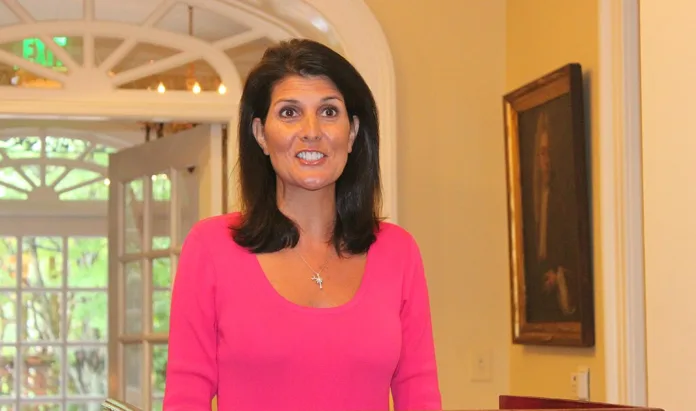Nikki Haley backs Trump for the 2024 election, emphasizing the need to challenge Biden’s policies
Former South Carolina Governor Nikki Haley publicly declared her support for Donald Trump’s 2024 presidential bid. This marks her first public statement since leaving the Republican primary two months ago. Haley, who served as the U.S. ambassador to the United Nations under Trump, acknowledged that while she has disagreed with some of Trump’s policies, she views President Joe Biden’s tenure as disastrous.
During a Q&A session at the conservative Hudson Institute in Washington, DC, where Haley now holds a senior position, she explained her decision. “Trump has not been perfect on policies important to me, like foreign policy and immigration, but Biden has been a catastrophe. So I will be voting for Trump,” Haley stated. She also thanked her supporters and encouraged Trump to reach out to her voter base.
Haley’s announcement follows a contentious primary season where she and Trump exchanged sharp criticisms. Despite their differences, Haley emphasized the importance of party unity. She noted, “Trump would be smart to reach out to the millions of people who voted for me and continue to support me, and not assume that they’re just going to be with him.”
Reflecting on her primary campaign, Haley expressed no regrets. She said, “We left it all on the field,” and acknowledged the ongoing support from her primary voters. This lingering support highlights a challenge for Trump to unify the party, particularly in suburban areas of swing states.
Haley did not mention Trump during her speech at the Hudson Institute, only addressing him during the Q&A session. She criticized what she termed a “dangerous worldview” rising on both sides of the political aisle, emphasizing the need for serious consideration of threats to prosperity and security. She voiced strong support for Israel’s war with Hamas and criticized Biden for placing conditions on military aid to Israel.
Haley also urged Republicans to back military aid for Ukraine and Israel, framing it as an investment in global stability. “Sending weapons to Ukraine and Israel isn’t foreign aid,” she argued. “It’s an investment in a world where authoritarian dictators cannot run roughshod over free countries.”
Since leaving the race in March, Haley has focused on family, particularly reconnecting with her husband, Michael, who recently returned from a yearlong overseas deployment. Despite her absence, she continued to garner significant support in Republican primaries, posing a potential challenge for Trump in rallying the party’s base.
Trump has not extended an olive branch to Haley or her supporters. Conversely, the Biden campaign has targeted Haley’s supporters through ads, reminding them of Trump’s past insults toward her. Biden’s campaign asserts that Haley’s support for Trump does not change the fundamental choice voters face. “Nothing has changed for the millions of Republican voters who continue to cast their ballots against Donald Trump in the primaries,” said Michael Tyler, Biden’s campaign communications director.
Rep. Ralph Norman of South Carolina, who initially endorsed Haley before switching to Trump, believes Haley should be on the GOP ticket. He has advocated for Haley as a vice-presidential candidate, suggesting her primary performance indicates strong support. However, Trump has stated Haley is not under consideration for the role but wished her well.
Haley has neither confirmed nor denied a potential 2028 presidential bid, leaving her future political plans open. In her recent speech, she struck an optimistic note, saying, “We are blessed to live in America. And as every generation of Americans proves, we always rally to defend that blessing.”
Analysis
Nikki Haley’s endorsement of Donald Trump for the 2024 presidential election highlights significant dynamics within the Republican Party. Her support underscores a strategic decision to prioritize party unity against a common opponent, President Joe Biden. This move reflects Haley’s pragmatic approach, balancing her criticisms of Trump with a broader political strategy.
From a political perspective, Haley’s endorsement signifies her recognition of Trump’s enduring influence within the Republican base. Despite their contentious primary battle, Haley’s support aims to consolidate the party’s efforts to reclaim the presidency. This alignment suggests a pragmatic shift, prioritizing electoral success over personal grievances.
Sociologically, Haley’s decision may resonate with a segment of Republican voters who value party unity and strategic alliances. Her emphasis on issues like foreign policy and national security appeals to conservative constituents concerned about America’s global standing. By supporting Trump, Haley aligns herself with a broader conservative agenda, aiming to influence key policy areas.
Economically, Haley’s endorsement may impact campaign dynamics and fundraising efforts. Her support could attract donors who were initially aligned with her primary campaign, bolstering Trump’s financial resources. Additionally, Haley’s criticism of Biden’s economic policies aligns with broader Republican critiques, potentially swaying undecided voters concerned about economic stability.
Locally, Haley’s continued support in Republican primaries highlights her influence in suburban swing states. Her endorsement may mobilize voters in these critical areas, affecting the electoral map in the upcoming election. This local dynamic underscores the importance of Haley’s political base in shaping national outcomes.
From a gender perspective, Haley’s endorsement as a prominent female politician within the Republican Party reinforces the visibility of women in leadership roles. Her strategic decision to support Trump, despite past conflicts, illustrates the complexities female politicians navigate in a predominantly male political landscape. This move could inspire other women to engage in political discourse and pursue leadership positions.
In terms of race and minority perspectives, Haley’s background as a woman of Indian descent brings a unique dimension to her endorsement. Her support for Trump, who has faced criticism for his stance on minority issues, may provoke varied reactions within minority communities. Haley’s endorsement could be seen as a bridge-building effort, emphasizing shared conservative values over racial and ethnic divides.
Haley’s endorsement reflects broader theoretical perspectives on political alliances and strategic decision-making. Her support for Trump exemplifies realpolitik, prioritizing pragmatic considerations over ideological purity. This approach aligns with theories of political strategy that emphasize coalition-building and electoral success.
